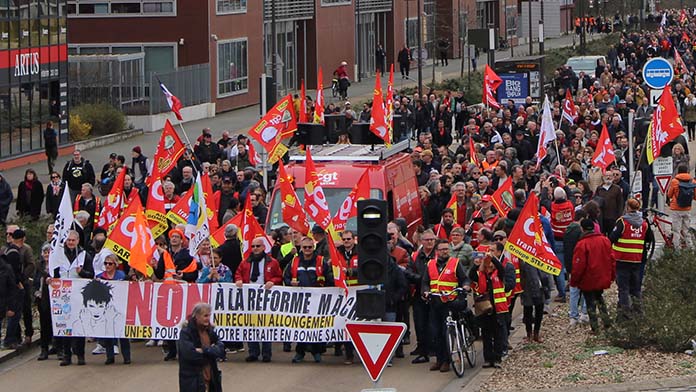French workers are staging a mass, rolling strike wave against President Macron’s attempt to force people to work longer before they can retire.
The strikes are summed up by the slogan “Metro, Boulot, Caveau” literally “Commute, Work, Grave”—but meaning “worked to death”.
Macron’s decision to use presidential powers to force through his pensions legislation without a parliamentary vote has enraged people, sending the revolt to a new level.
On 20 March, he survived a parliamentary vote of no confidence by a bare nine votes. But the struggle in the workplaces remains the key to defeating him.
Through March, strikes and mass protests shook almost all the major cities of France as well as many smaller towns.
The key port city of Le Havre was taken over by strikers in February, closing the port area and the entire industrial zone, including the Total oil refinery, a Renault car plant, Chevron chemicals and Safran rocket and aero engines factories.
Major strike days have seen monster rallies in Paris of up to 800,000 people, growing from a 400,000-strong protest in January.
Weeks of mass strikes have mobilised the French working class in greater numbers and on a wider scale than the revolt in January 2020 which delayed Macron’s pensions assault.
There has been strike action on airlines, buses and docks, in education—nurseries, primary and high schools and universities—electrical, nuclear power and oil refineries, public services, the Paris metro, the railways, in retail and sanitation. More than 6000 tonnes of garbage lie rotting on Parisian streets.
Attempts by riot police to break a picketline at the Gonfreville-l’Orcher refinery near Le Havre failed after 500 supporters arrived to resume picketing.
Public support for the strikes has been unprecedented. At least 70 per cent of the population support the fight, with even higher support among those under 60.
As John Mullen, a socialist in France, wrote, “Even mainstream news channels—attempting to remain relevant—are inviting radical union reps on air, where they defend in detail the need for a general strike.”
More than 300 cities and towns erupted in protest after Macron bypassed parliament.
Class war
Mainstream French political life has been dominated for more than 30 years by the ruling class’s desire for a “French Thatcher” able to decisively defeat the unions, in order to slash spending on social welfare, drive down workers’ conditions and make France more competitive with its EU rivals.
Little wonder that Bernard Arnault, the world’s richest man and owner of French luxury group LVMH, including the Louis Vuitton brand, has emerged as a hate-figure of protesters who carry “Wanted” signs sporting his face.
Successive presidents and prime ministers have tried to attack pensions. In 1995 Prime Minister Alain Juppe’s effort to increase the retirement age by two and half years together with broader cuts detonated strikes which paralysed the country for weeks, dealing the government a major defeat.
In 2010 President Nicholas Sarkozy succeeded in increasing the pension age by two years to 62.
Now Macron wants to push it up further to 64. He is also attacking several specific industry retirement agreements, which have been won over the years by workers with the strongest unions. Macron disparagingly calls them “special regimes”.
French working class unity is hampered by the division between several union federations.
Pressure from rank-and-file workers led to a united union call to “Bring France to a standstill on 7 March”.
But the leaders of one federation, the CFDT, aligned with the moderate Socialist Party, explicitly said this was not a general strike.
The more combative federation the CGT, aligned with the Communist Party, “allowed” its members to meet the following day in each workplace to vote on “renewable strikes”. That meant voting to continue striking every day or two at a rank-and-file level, without authorisation from their national office union officials.
The Autonomie de Classe revolutionary socialist group argued, “After mobilisations of a scale unprecedented since the 1995 victory against the government and anger that goes far beyond the sole pension reform, a question reverberating in all conversations of those who take part in the fight is … How to win?
“The ruling class is determined. The world they rule is collapsing, and they will do anything to preserve it … We need … a strategy that paves a path to win.”
Regular workplace meetings have produced ongoing strikes in the railways and the Paris metro, in ports, in chemical plants, and indefinite strikes among garbage collectors and at four major oil refineries.
But union leaders have resisted calls for an indefinite general strike. Increasing rank-and-file organisation and control of the movement is needed to deliver action that can force Macron to give in.
By Tom Orsag






